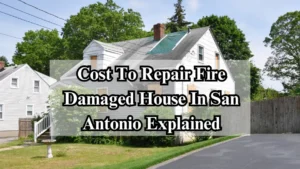Have you ever heard of a distressed property? Don’t worry, it’s not as scary as it sounds! A distressed property is a fancy way of saying a house is in pretty bad shape or has money troubles. Maybe the roof is falling apart, or the owner can’t pay the mortgage anymore. Whatever the reason, these houses often need a lot of work and usually sell for less money than other homes. Let’s dive in and learn more about these fixer-uppers.
What Is a Distressed Property?
Imagine a house that’s seen better days. Maybe it’s got a leaky roof, or the walls are cracking. That’s what we call a distressed property. It’s a home that needs some serious TLC (tender loving care) because it’s in pretty bad shape. These houses often need a lot of work to make them livable again.
A distressed property isn’t just about how it looks. Sometimes, it’s about the owner’s situation. For example, if someone can’t pay their mortgage anymore, their house might be considered distressed even if it looks okay from the outside. So, when we talk about distressed properties, we’re talking about houses that have problems—either with the building itself or the owner’s ability to keep it.
Different Types of Distressed Properties
Not all distressed properties are the same. Let’s look at some common problems these houses might have:
Bad Roofing
Picture this: you’re in a house, and every time it rains, you must put out buckets to catch the water. That’s what happens when a roof is in bad shape. A leaky roof can cause problems like mold and damage to the walls and floors.
But it’s not just about leaks. Sometimes, the shingles might fall off, or there could be holes where animals can get in. A bad roof can make a house feel unsafe. Plus, it can lead to higher energy bills because all the warm or cool air escapes through the top of the house.
Septic Tank Issues
Okay, this one could be more pleasant, but it’s important. A septic tank is where all the yucky stuff from toilets and sinks goes. It can cause bad smells and even health problems when it’s not working properly. Yuck!
Septic problems can be tricky because you can’t see them. But you might notice that the grass over the septic tank is extra green, or there might be wet, smelly spots in the yard. These are signs that something’s not right underground. Fixing septic issues can be expensive, so it’s a big deal when selling a house.
Wonky Windows
Have you ever felt a draft even when all the windows are closed? That’s what happens when windows are old or not installed correctly. They let cold air in during winter and hot air in summer, which can significantly raise your energy bills.
But drafts aren’t the only problem with bad windows. Sometimes, they might be painted shut or don’t open and close smoothly. In older houses, the glass might be so thin that it doesn’t keep out noise from outside. All of these issues can make living in the house less comfortable.
Infestation Issues
Imagine sharing your house with unwanted guests like mice, rats, or termites. That’s what an infestation is. These little critters can cause much damage and make a house unsafe.
Infestations are more than annoying—they can be dangerous. Rodents can chew through wires and cause fires. Termites can eat away at the wood that holds the house up. And some pests, like cockroaches, can make people sick. Getting rid of an infestation can be a big job, and it needs to be done before most people want to live in the house.
Foundation Issues
The foundation is like a house’s feet. When it’s damaged, the whole house can become unstable. You might see cracks in the walls or floors that won’t stay level. This is one of the most serious problems a house can have.
Foundation problems can happen for many reasons. Sometimes, the ground under the house shifts, or water damage weakens the concrete. Whatever the cause, it’s a big deal. Fixing foundation issues is usually very expensive and can take a long time. That’s why houses with foundation problems are often considered seriously distressed.
Can Distressed Properties Be Sold?
You might wonder, “Can anyone sell a house with all these problems?” The answer is yes! It might not be as easy as selling a perfect house, but it’s possible. There are people out there who like to buy fixer-uppers and turn them into beautiful homes.
Some people make a living buying distressed properties, fixing them, and selling them for a profit. These folks are often called “house flippers.” They see the potential in a run-down house that others might miss.
But it’s not just professional flippers who buy distressed properties. Sometimes, people looking for a good deal on a house they can afford are interested in these properties. They might be willing to work to fix up the house in exchange for a lower purchase price.
How To Sell a Distressed Property
So, how do you go about selling a distressed property? Here are some tips:
- Be honest: Tell potential buyers about all the problems. It’s better to be upfront than to have them find out later and get upset. Make a list of everything that needs fixing and share it with anyone interested in the house.
- Price it right: You can’t ask for top dollar for a house that needs much work. Set a fair price that takes into account all the repairs needed. You might want to get estimates for the repairs and subtract that from what the house would be worth if it were in good condition.
- Find the right buyers: Look for people who like to fix up houses or investors who buy properties to renovate and sell. You can ask your real estate agent to help you find these kinds of buyers or look for local real estate investor groups.
- Highlight the good stuff: Even if the house needs work, it might have some great features, like a big yard or an excellent location. Make sure to point these out! Maybe the house has beautiful old hardwood floors under the carpet, or maybe it’s in a neighborhood that’s becoming more popular.
- Consider selling to a cash buyer: Some companies buy houses “as-is,” which means you don’t have to fix anything before selling. These buyers usually offer less money, but the sale can happen quickly and with less hassle.
- Get help from a real estate agent: They know the market and can help you find the right buyers for your distressed property. Look for an agent who has experience with fixer-uppers or investment properties.
- Be flexible: You should be open to different types of sales, like a short sale if you owe more on the mortgage than the house is worth or an auction if you want to sell quickly.
- Prepare for a lengthier sale process: Selling a distressed property often takes longer than selling a house in good condition. Be patient, and don’t get discouraged if it doesn’t sell immediately.
Dos and Don’ts When Selling a Distressed Property
Let’s talk about some things you should and shouldn’t do when trying to sell a distressed property:
Do:
- Clean up as much as you can. A tidy house always looks better, even if it needs repairs. Mow the lawn, clear out clutter, and make the place as presentable as possible.
- Take lots of pictures to show potential buyers what they’re getting. Include photos of any problems so buyers know exactly what they’re dealing with.
- Be ready to negotiate. Because of all the work needed, buyers might want to pay less. Have a bottom line in mind, but be willing to listen to offers.
- Get estimates for repairs. This can help you and the buyer understand the costs involved. It shows you’ve done your homework and can make negotiations easier.
- If you can, consider offering seller financing. Some buyers might be interested in the property but have trouble getting a traditional mortgage for a fixer-upper.
- Be patient. The right buyer might take some time to find, but they’re out there.
Don’t:
- Try to hide problems. It’s not fair, and it can get you in trouble later. Plus, it’s usually illegal to hide known issues with a property.
- Spend a lot of money on major repairs. The new owner might want to do things differently anyway. Focus on minor, inexpensive improvements that make the house look better.
- Get discouraged if it takes a while to sell. Finding the right buyer for a distressed property can take time. Stay positive and keep marketing your property.
- Forget about curb appeal. Even if the inside needs work, making the outside look nice can attract more buyers. A fresh coat of paint on the front door or some flowers in the yard can make a big difference.
- Ignore offers that seem low at first. Sometimes, a low offer can be negotiated into a fair deal for both sides.
- Forget to disclose everything. In most places, you’re required by law to tell buyers about known problems with the house. Being upfront can protect you from legal issues down the road.
Conclusion
Selling a distressed property might seem tough, but it’s not impossible. Remember, there are people out there who love to take on projects and fix up old houses. Your distressed property might be just what they’re looking for!
The key is to be honest about the house’s condition, price it fairly, and find the right buyers who see its potential. Don’t get discouraged if it takes a little longer to sell than a perfect house. With patience and the right approach, you can sell your distressed property.
We buy houses Texas homeowners need to sell quickly. Contact us to start the process. After showing us your home (or sending us pictures), we will provide you with a fair estimate and close on your schedule. You can have your cash on hand in as little as a few weeks










